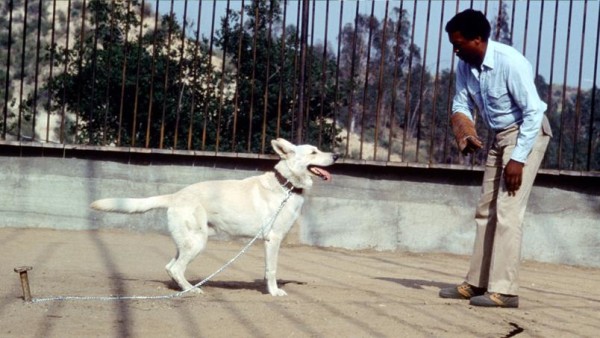
Hailed as a masterpiece by some, Sam Fuller’s drama, about a white German shepherd dog trained to attack black people, is the kind of picture rarely made by big Hollywood studios. It’s simply too controversial and real-life for the dream factory to handle. When execs either lose their marbles or bravely edge a bet, we get misfit movies such as Freaks (1932) or White Dog (1982) – pictures that disturb the consensus so greatly that they must be surpressed.
Like Robert Bresson’s Au hazard Balthazar (1966), it projects onto a luckless and innocent beast the psychologies and ugliness of the human mind, producing a symbolic and ruminative discourse on hate and racism.
White Dog is a work at once melodramatic and steely-eyed, prosaic and punchy. The screenplay was a hot property in the 1970s and Paramount Pictures had high hopes for it, but the execs eventually gave the project to Samuel Fuller, an iconoclast B-movie auteur rather than a studio journeyman.
White Dog worried Paramount Pictures and they disowned it, near enough, after negative word of mouth developed that what was turned in was a racist tract. To read White Dog as containing pro-racist ideology or defamatory content is entirely wrong.
Shot by Clint Eastwood’s cameraman Bruce Surtees, co-written by Curtis Hanson and scored by Ennio Morricone, White Dog is a work of sinister mood and steadfast remit. Fuller’s style is muscular and cinematic without ever drawing too much attention to itself –the mark of a true master of cinema…
The film’s final scene is hard to stomach, not just for the lurch from triumph to tragedy, but for the strong declaration made on its chosen themes. The use of slow motion and the cutting back and forth between figures, as they look on in horror and regret, is truly downbeat. Fuller does not serve up a sugarcoated, candy floss ending, where everything is made right in the world, the type usually demanded by studios and the mainstream public. We’re left instead to swallow a dose of truth that will be quite sickening to hopeful souls.
Extras
There are no extras on the disc. The booklet, however, boasts a fine essay by Jonathan Rosenbaum; a rather eccentric interview transcript, that purports to have been undertaken between Fuller and the dog (even if multiple dogs were used during filming), and the White Dog Scrapbook.
Martyn has awarded White Dog four Torches of Truth
















{ 0 comments… add one now }